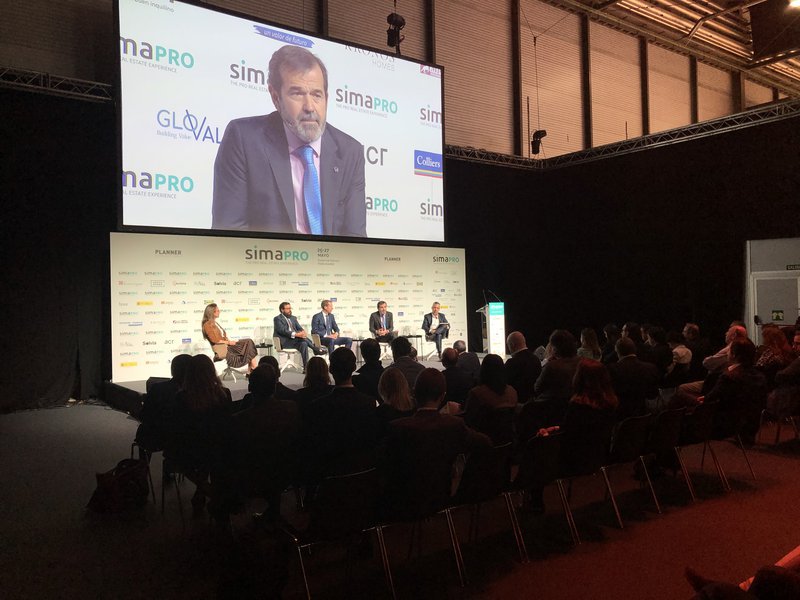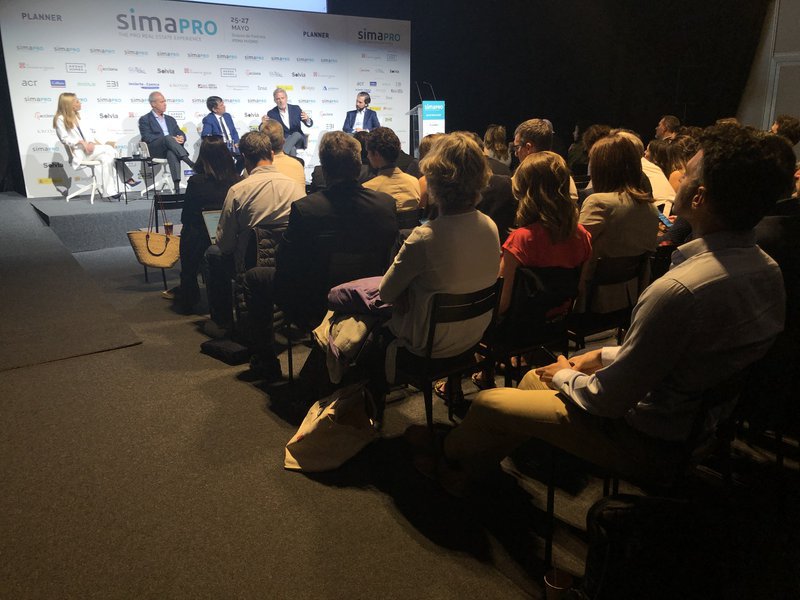The SIMAPRO Forum, which is held on May 26 and 27 in parallel to the SIMA Real Estate Exhibition, has left a large number of statements, conclusions and analyzes on its first day, from the hand of the most prominent experts in Spanish real estate. From early in the morning until well into the afternoon, through the doors of the two rooms of SIMAPRO, presidents, general directors, mayors, deans and directors of the most diverse private companies and public administrations have been entering and leaving.
The first four talks of the day took place in room 2 of SIMAPRO. The first of them was entitled The Coming World: the new geopolitical chessboard and its economic effects in Spain and Europe, was presented by Carmen Panadero, president of Wires, and featured Federico Steinberg, principal investigator at the Elcano Royal Institute, as a speaker. lonely. Steinberg gave an overview of the economic and political scenario in which we currently operate, with special emphasis on the real estate sector, and drew a few strokes on what we can expect in the future in the medium and long term.
Next came the turn of the table The world to come: a vision from real estate, also presented and moderated by Carmen Panadero. His speakers were Asís Colomina, director of real estate development for Acciona in Spain; Michel Elizalde, CEO of ACR; Juan Fernández-Aceytuno, CEO of ST Sociedad de Tasación, and Rui Meneses Ferreira, CEO of Kronos Homes.

The third talk, Residential rental hits the accelerator, was given by Antonio de la Fuente, managing director of corporate finance at Colliers International Spain; Eduardo Guardiola, managing partner of Catella Investment Management, Teresa Marzo, CEO of Elix, and Jesús Ruiz, senior development director of Greystar. It was moderated by Beatriz Toribio, an expert in the real estate sector, and in it the experts talked about how renting is gradually gaining ground on property, but also about the investment that would be necessary to satisfy this increase in rental demand. Specifically, Teresa Marzo pointed out that in Spain there are currently four and a half million homes for rent, which means that 24% of the total population lives in this regime. But, according to the data released in March, that percentage could increase to 35% in the coming years. Generating two million rental homes in a couple of decades is, without a doubt, a real challenge for agents in the real estate sector and for public administrations.
SIMAPRO proceeds at full speed
As the morning progressed, more and more attendees gathered at the gates of Hall 8 of Ifema, eager to learn about the latest developments in Spanish real estate. The fourth table of the day, Madrid, a sustainable investment destination, was moderated by Alberto Valls, president of ULI Madrid and Deloitte Financial Advisory partner. In it, the speakers explained why Madrid is an interesting destination for international investors and what it would take to make it even more so. Esther Escapa, local head of transactions Iberia and developments Iberia and Italy at AXA Investment Managers; Roberto Rey, president and CEO of Gloval; Alfonso Vergara, founder and honorary president of Fundación Metrópoli, and José María Ortega, general coordinator of urban development of the Madrid City Council, debated for almost an hour about the ups and downs of the Spanish capital as a destination for foreign investment. Roberto Rey stated that "in the 1980s, sustainable development was a matter of dreaming, and now we are in the future thanks to those who dreamed before. We have clearly seen that investing in energy efficiency is profitable". However, Esther Escapa considered that this sustainable development does not make sense if it is not incorporated in a parameterized way: "we must incorporate elements that we can measure and that we can demonstrate to our investors, and to society, which in the end are the people who they use the assets in which we invest, which are the ones that later configure the cities, the ones that truly make up the fabric".
In the fifth presentation of the day, some of the most interesting topics of the moment were touched upon. With the title The living room, a growing sector: investment and trends in Europe and Spain, this table had Antonio Gil, director of Iberian Property, as moderator, and four experts with extensive experience as speakers. José Antonio Granero, founder-partner architect of Entreabierto, commented that "the health crisis has made us aware of the importance of the built environment, the stage of our lives. Above all, we have realized the importance of life in common, of personal and social relationships. Of how important it is to share". And that, precisely, is the key to the new living room models. "The incentive for sharing is what makes the difference between traditional rentals and the new housing models," he concluded. For his part, Jorge Pereda, rental residential director of Grupo LAR, argued that in a few years many hundreds of thousands of living rooms will be needed, but "How are we going to make a million housing solutions if we have so many barriers I always defend public-private collaboration, but for that collaboration to exist, the first thing is that they give us a license in four months, not in a year, and that they provide us with a stable regulatory framework in which we can work".

Antonio Mochón, CEO and founding partner of Excem Socimi - Homiii, emphasized that the difference between traditional rental and new housing models lies in what users are looking for. "The public that goes to a coliving wants to share. It is a student or a young professional who not only wants to live in a house for a certain time, but what they are looking for is to meet people from other countries and cultures, share studies and live an experience". Finally, it is worth noting the statements of María Matos, director of studies and spokesperson for Fotocasa, who considered that "society is constantly changing very quickly, and the living room model is going to have to adjust to the new demands and the new requirements of these new citizens". "In 20 years' time, -continues María- it is estimated that 30% of households are going to be of one person, but by 2040, 50% of families are not going to have children or are going to be single parents. And that, logically, is going to radically influence the typology of the dwellings. In the opinion of María Matos, in the near future "it will be the new citizens who will design the new homes, the concept of sustainability, the new educational model, the new society and, of course, the new housing models."
